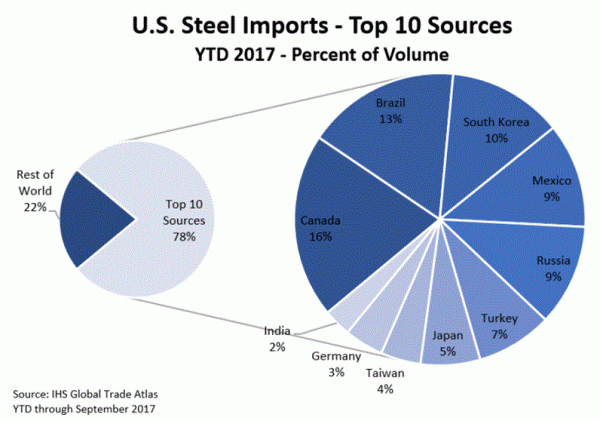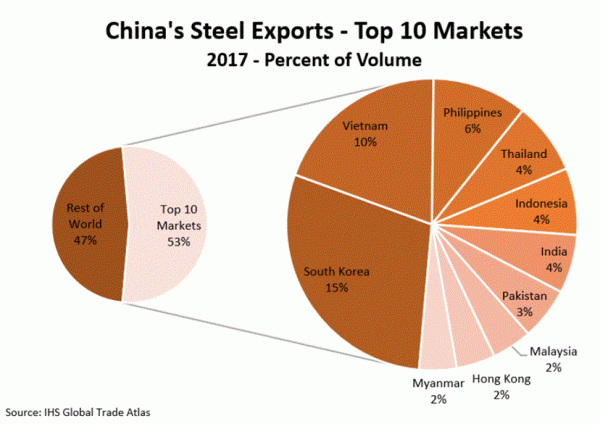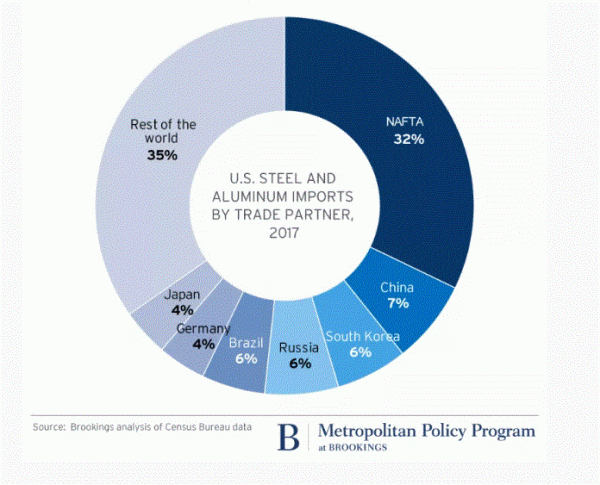Over the past months, US trade policy has been a major cause of the wax and wane of the financial markets. The White House has triggered a number of investigations under the rarely used 1972 US trade law since Trump took office. All investigations have resulted in tariff imposition, claiming to be targeting China. While Trump’s tariff vow is indeed consistent with his brinkmanship foreign policy practice (pushing everything to an extreme in order to gain bargaining power), we notice that the tariffs announced are merely threats and do not intend to pose actually impact on Chinese economy.
Let’s have a review of the White House’s recent trade investigations and measures:
1. Section 232 investigations on steel, aluminum, and uranium – Reports on two investigations done on steel and aluminum imports last year were submitted to the president in January. Trump eventually signed orders to impose 25% tariff on steel imports and 10% on aluminum imports. Interestingly, despite the claim to target its biggest trading partner, China is only the 10th largest source of US steel imports, accounting for just 2% total US steel imports last year. The White House knows more than anyone else that China has reduced its steel exports to the US by a third after the then-president Barack Obama’s 500% steel tariff imposed in 2016. Chinese steel producers have shifted its focus from the US to Asia markets since then. China ranks number 3 as US aluminum imports. Yet, the impost amount has also been down -11% from last year.
In response, China last week announced plans to impose tariffs on 128 US products that include pork, wine, fruit and steel. It has revealed that tariff on US soy exports would be the last resort and the biggest bullet as about one-third of Chinese soy imports comes from the US. However, this would be an internecine scenario as tariff on US soy exports would raise the cost of some Chinese producers.
The biggest losers of the tariff plan would be Canada, Mexico and certain Eurozone members. However, US plan to exempt these countries has alleviated the concerns of producers from these countries. The exemptions have also reduced the tariff to something symbolic. Undoubtedly, shares of US steel and aluminum companies slumped after Trump’s announcement of a light version of the tariff plan earlier this month.


2. Section 201 investigations on solar panels and washing machines – the investigations resulted in tariffs on washing machines and solar panels announced on January 22. Imported washing machines would be subject to a 20% tariff for the first 1.2M units/ year, and 50% for units above that level (for 3 years). Imported solar panels would be subject to a tariff of 30% for the next 4 years, with an exemption for the first 2.5 gigawatts of imports per year. The measures are claimed to target China and South Korea, shipments from both sectors contribute less than 5% to the overall exports from either country to the US.
3. Section 301 investigations on China’s intellectual property and technology transfer – US last week announced tariffs on Chinese imports, worth about US $60B, in response to China’s of US technology and intellectual property. The measures target goods including clothing, shoes, and electronics and restrict some Chinese investment in the US.
US announcement of the latest tariff plan was shortly followed by China’s retaliatory policy (mentioned above). This dramatically led to negotiations between the two parties with US Commerce Secretary Wilbur Ross affirming the market that the country and China were “ending up with negotiated deals, not trade wars”. Ross, however, added that there would be limitations on foreign investment” and President Donald Trump would take “other action” on foreign takeovers. Indeed, there have been reports suggesting that the US was looking to protect the domestic tech sector by curbing investment from China, by using an emergency law.
There are practical reasons the US to show a tougher stance on trade policy recently. The mid-term election in November is approaching with all House seats and 34 senate seats re-elected. Given a number of failure, including Republican’s loss of the Alabama seat for the first time in 25 years, since he took office, Trump is obliged to impose measures that are appealing to his supporters. Indeed, various US industries have been complaining about China’s business practices, which are deemed to be unfair for foreign companies. For instance, pharmaceutical companies have complained that it takes over two years to get drug license in China. Meanwhile testing procedures are no compliant with international standards. For decades, credit card business in China remains monopolized by Union Pay which is sole provider of renminbi clearing services for bankcard transactions. This has prohibited Master/ Visa from tapping the Chinese market.
We would not feel surprise to see more announcements on trade barriers in the months ahead. While the trade news might cause market volatility, we do not believe the measures are intended to hurt the trade relations between the US and China.
